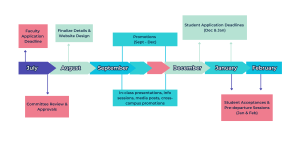Faculty seminar proposals

Summer 2026 proposals
Deadline: July 4, 2025
A Global Seminar provides UBC students with the opportunity to travel and study abroad with a group rather than individually. Global Seminars often focus on a particular region or topic of interest that isn’t currently offered through other UBC programs.
Global Seminars offer UBC faculty members a chance to “move the classroom” to a location that deepens the students’ learning experience. The international location and activities are essential to the course learning outcomes.
application
A Global Seminar proposal contains the following documents:
1. A qualtrics application form
- Instructor Information
- Program Details
- Course Information
- Student recruitment information
- Approvals
See the PDF Qualtrics Application to view the application questions.
2. Faculty support
The application will ask if your program is supported by the department and that faculty workloads and compensation have been discussed and agreed upon. Your Dean and Department Head will need to provide final approval and this will be sought directly from Go Global.
3. Course sylLabus
The application asks you to upload a course syllabus that outlines the course, assignments, and learning objectives. If this is not ready to be uploaded to your Qualtrics application, you can submit it at a later time.
4. Program Itinerary
Outline the students’ rough itinerary, including desired field visits, teaching locations and duration of stay in various locations, and any other important elements of the travel plan. This will evolve as we finalize your program, you can provide a rough guide on your application. You can see an example here: Program Itinerary Template.
5. Budget template
You need to submit a budget for your program which outlines the costs for faculty, students and other program-related costs. Go Global will work with you on finalizing this budget, so your uploaded budget can be just a first draft. See the budget template here: Faculty – Budget
Submission
All applications are submitted via Qualtrics.
Deadline is July 4, 2025
Questions? Contact us at:
goglobal.okanagan@ubc.ca
Timeline

Frequently asked questions
- Go Global is a key resource at UBC for international learning programs.
- We offer expertise in international academic processes, administering international programs, and credit transfer.
- We offer expertise in establishing and maintaining partnerships with community partners abroad.
- Our development of the UBC Student Safety Abroad Protocol ensures that our programs adhere to the strictest safety standards.
- We routinely promote international learning programs throughout UBC (Vancouver and Okanagan campuses); students associate Go Global with international learning.
- We regularly advise students on partnerships with over 150 partner universities and over 15 Global Seminars.
Global Seminars are typically led by one or two UBC faculty members, and sometimes in partnership with colleagues from a UBC partner university in an international location. The faculty member who plans to lead the Seminar is called the “program director.”
Faculty members collaborate with Go Global to develop a Global Seminar. Specific roles and responsibilities of the program director and Go Global staff will be discussed following a successful proposal, and then outlined in an Essential Tasks Agreement. Because of the variation across seminars, this agreement is customized for each program. Responsibilities to be discussed include program planning, finances, student recruitment and advising, participant selection, risk management, and facilitating pre-departure and return sessions.
Faculty members negotiate with their department head/dean how the teaching of a seminar is distributed in relation to their teaching load.
The process of developing a Global Seminar program is a collaborative experience, involving faculty, department heads, Deans, and Go Global.
Go Global staff are an important part of the proposal development and program building phases for every seminar and will provide:
- Access to international education professionals: we can connect you to experts who can assist you in developing and implementing your program and provide support to you and your students before, during, and after the program (e.g., program planning, integrating best practices in international education and experiential education, recruiting and student advising, risk management and emergency response training, and trouble-shooting while you are in the field).
- Support in seminar financial matters: Go Global’s finance personnel will assist in navigating the standardized billing system (e.g. collecting student fees, paying deposits for facilities in the host country) and managing travel claims when you return.
- Information and contacts: if you decide to work with a partner institution during your seminar, we can help you connect with UBC’s international partner universities and organizations.
Global Seminars occur where international travel is essential to the student learning goals. The location and activities are relevant to the course content. Often faculty members identify a location based on their expertise in the area and its relationship to course objectives.
Seminar locations should also be determined with student safety in mind. UBC authorizes undergraduate students to travel to destinations that the Department of Foreign Affairs and International Trade Canada (DFAIT) designate as regions to which Canadians should “exercise normal security precautions” and “exercise a high degree of caution.” For more information, consult UBC’s Student Safety Abroad website.
A Global Seminar typically involves one to two courses and can range in length, often from two to six weeks. Two and three-week programs may be better in more expensive locations. A Global Seminar can occur at any time throughout the year, although summer programs (May-Aug) tend to be the most common and most useful for students. In many previous seminars, three weeks is equal to three credits.
Seminars typically involve one or two courses and total three to six credits. We’ve found that seminars that offer upper level credits are more popular for students.
Given the high price of travel, you might choose to create a hybrid program. This means having 1-2 weeks synchronous online, followed by 2-3 weeks abroad.
Proposals will be reviewed by a Global Seminar advisory committee composed of UBC staff members who have expertise in the development and implementation of international programming at UBC as well as current students who can provide a student-centered lens to your program. The advisory committee will use the following criteria to assess a proposal:
- The program’s international activities are essential to the course learning goals, and assignments guide students to make connections between their international experience and the learning goals.
- The program director intends to work collaboratively with Go Global to develop and implement the program.
- Program activities integrate experiential learning approaches, cross-cultural understanding, and student safety, and attend to group dynamics among participants.
- The department head and Dean support the program and indicates that faculty members are available to instruct the courses.
- The budget outlines costs that are reasonable in relationship to program activities, location, duration, and the number of credits allocated. The budget considers program costs from a student perspective by eliminating extraneous fees, and includes modest accommodations.
- The program directors have considered potential student safety concerns and present risk mitigation strategies.
Because Global Seminars operate on a cost-recovery basis, your budget needs to demonstrate how you will generate adequate revenues — typically done through the program fee that participating students pay — and balance those against expenses.
A Global Seminar budget should include items that are integral to students’ learning in the program. This will depend on the program but may include day trips, accommodations, group meals, or honoraria for non-UBC experts. A faculty member’s salary is covered by their department and should not be included in the budget, however their accommodation and per diem should be included. Use the supplied seminar budget template to calculate the overall program fee and the total cost to students.
As you complete your Global Seminar budget template, you may wish to refer to this list of helpful tips:
- Program name: Please fill in at top of form
- Number of students: In cell B3, indicate the estimated number of students who will participate in the program. Provide an exact number rather than a range of numbers. You may do multiple cost projections by changing this number.
- Exchange rate: If you have quotes in a different currency, convert to Canadian using the exchange rate provided at www.oanda.com. Fill in the exchange rate in cell B2.
- Program costs: In row D, provide the “Per Student Cost in Canadian Currency” for each line item that you wish to include in the budget. The total cost for each line item (column E) will automatically calculate based on the number of student participants you entered.
- Contingency fund: A 10% contingency will be added to the program cost subtotal. This is included to cover unforeseen costs and emergencies. You can increase this number if you wish – especially with intense currency fluctuations that are now quite normal.
Please reach out with any questions about this budget as we recognize it can be daunting at first. We can help guide you through this process.
Applicants for Global Seminars proposed for Summer 2026 will be contacted quickly following the July deadline to talk more about the proposal. Final decisions will be made in early August 2025.
Go Global will contact you once the Global Seminar advisory committee has reviewed your proposal. Once approved, you will create an essential tasks agreement with Go Global, which outlines who will be responsible for the range of activities required to set up and manage your Seminar.
You will also begin working with Go Global to create a safety and emergency management plan, expand and finalize the budget, and collaboratively develop the program.